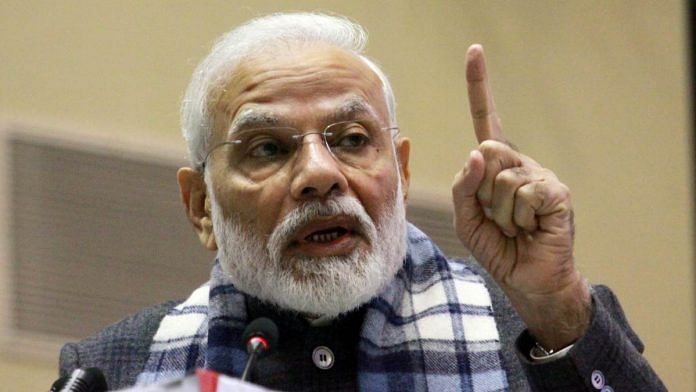New Delhi: A global best practices template and a joint fund are expected to emerge from the G20 Extraordinary Virtual Leaders’ Summit on coronavirus to be held later Thursday as India prepares to discuss and work out a joint, comprehensive strategy in addressing the pandemic.
According to sources, a global template as well as the G20 communique on the novel coronavirus pandemic is expected to be issued.
The countries will also raise the issue of a common economic package to deal with the poor and marginal as well as for the workers in the unorganised sector in some G20 nations, said the sources.
In a statement on Twitter Wednesday, Prime Minister Narendra Modi said, “The #G20 has an important global role to play in addressing the COVID-19 pandemic. I look forward to productive discussions tomorrow at the #G20VirtualSummit, being coordinated by the Saudi G20 Presidency.”
The #G20 has an important global role to play in addressing the COVID-19 pandemic. I look forward to productive discussions tomorrow at the #G20VirtualSummit, being coordinated by the Saudi G20 Presidency. @g20org @KingSalman
— Narendra Modi (@narendramodi) March 25, 2020
Official sources told ThePrint that the virtual leaders’ summit will be taking place via videoconferencing, on the lines of the SAARC conference that took place on 15 March, where a common approach, and most importantly, a common Covid-19 Emergency Fund was discussed and established.
The G20 grouping consists of Argentina, Australia, Brazil, Canada, China, France, Germany, India, Indonesia, Italy, Japan, Mexico, Russia, Saudi Arabia, South Africa, Republic of Korea, Turkey, the United Kingdom, the United States and the European Union.
The pandemic has now spread to most of the countries on the planet, claiming over 16,000 lives in more than 4 lakh cases. India has reported more than 10 casualties amid 600 plus cases.
Also read: 13 flights landed across India’s 5 busiest airports hours after the flying ban
‘Mitigating the challenge’
Speaking to ThePrint, Raji Rajagopalan, distinguished fellow, Observer Research Foundation (ORF) said, “The most important issue to be looked at this point of time is that of how countries can work towards mitigating this humongous challenge unitedly. There is a China template and then there is a South Korea template, which has also been able to effectively flatten the curve.”
Rajagopalan stressed the need for the G20 countries to look at the Taiwanese model, which has been able to manage the crisis despite being located closest to China.
“Taiwan had learnt its lesson during the SARS crisis. So this time they were better prepared. WHO has not focussed much on the Taiwanese model. The G20 should ponder on that,” she added.
According to Rajiv Bhatia, distinguished fellow at the Gateway House, India should take lead in this year’s G20 conference as it’s at PM Narendra Modi’s behest that the leaders are having the conference via videoconference.
Bhatia referred to the SAARC Covid-19 Emergency Fund to suggest that the G20 should also look at creating a common fund even as the leaders need to put an “additionality” into addressing the monumental challenges arising out of the pandemic.
With India set to assume the G20 presidency in 2022, it is imperative that the country comes to the forefront in bringing out tangible outcomes from other nations that are going to address the issue in a long-term manner.
Also read: A lockdown is the health response to fight coronavirus, but where is the economic plan?
G20 must address economic impact, shortage of medical devices
Not just the G20 countries, but economies around the world are facing an economic downturn as financial activity slows and labour shortages become a global issue.
“India, with its large-scale workforce in the unorganised sector and poor people, should take up the issue of the economic impact along with others and push organisations like the World Bank and International Monetary Fund to come up with a plan,” said former foreign secretary Kanwal Sibal.
He added that this is the time for countries to come out with common economic tools through the G20 as the present crisis is going to be much worse than the 2008 financial meltdown.
On 23 March, the G20 Finance Ministers and Central Bank Governors met virtually under the Saudi G20 Presidency to discuss the impact of the coronavirus pandemic on the global economy, and coordinate efforts in response to the challenge.
Rajagopalan said the G20 should also address the shortage of medical devices as countries across the world, including India, are now grappling with the lack of enough ventilators, masks and other kind of protective gears to effectively face the coronavirus outbreak.
“This is a real issue. We cannot take these devices from China as the question of quality controls comes in there. And globally there is a shortage, so India needs to look at some other options. Maybe Singapore and South Korea can help in these matters,” said Rajagopalan.
“Europe is in a crisis itself, but this has to be a priority.”
According to Sibal, the US should take the lead in this as it has gone for mass production of ventilators. He also said countries should discuss and make available adequate quantity of vaccines and antidotes for Covid-19 as and when they are globally proven to be effective.
Conference details
Apart from the G20 member countries, other countries like Singapore, Spain, Jordan, and Switzerland will also join the G20 conference this time.
Besides, international organisations such as the United Nations, World Bank, World Health Organization, World Trade Organization, Food and Agriculture Organization, Finance Stability Board, International Labour Organization, International Monetary Fund and the Organization for Economic Cooperation and Development will also be joining the video-conference, Riyadh said in a statement.
ASEAN chair Vietnam, African Union chair South Africa, Gulf Cooperation Council chair UAE and New Partnership for Africa’s Development (NEPAD) chair Rwanda will represent the respective regional organisations, said the statement.
Also read: Terrorists can weaponise coronavirus. Armed forced need to be extra-vigilant



